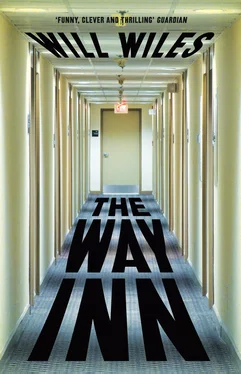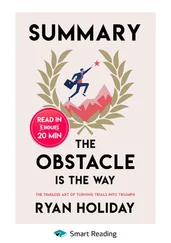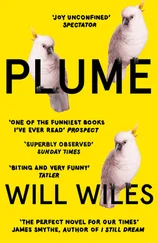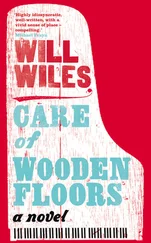The man behind the desk beamed at me. He was young, no more than early twenties, and wore – like all his colleagues – a long-sleeved red polo shirt with buttons at the collar and Way Inn embroidered in white over the breast. ‘This can happen sometimes,’ he said in accented English; Dutch, maybe. ‘Have you had your card in your pocket with perhaps your keys and your cellphone?’ Keish, shelfon. ‘The card can lose its magnetism. Please, let me see it.’
I gave the man the card. It disappeared from sight beneath the counter to be re-enchanted. Seconds passed, and I took in the reception desk. Above it, Way Inn was spelled out in bold perspex letters, lit red from behind. The desk was more a counter on my side, high enough that it required me to raise my elbows if I wanted to rest them on the dark, polished wood.
‘OK then,’ the young man said. ‘That should work just fine now – let’s go see.’ He stood, eagerly, my keycard still in his hand.
‘That’s really not necessary,’ I said. ‘I can let myself …’
But the helpful fellow was up and out from behind the desk, heading towards the rear of the lobby in a determined straight line. Watching the man’s back, I noted with dismay that he was aimed at the elevators rather than the stairs. ‘Surely the stairs …’ I began, again, but the man had pressed the button and smiled a prim little smile at me. We waited together, an awkward, chaste, moment. I tried to look as if I was preoccupied with matters of grave importance; the staffer looked up, as if blessed with X-ray vision and able to see the lift approaching through layers of concrete and breezeblocks.
‘Awful weather today,’ I said. I had to say something.
‘Awful,’ the young man said, shaking his head at the horror of it all. ‘It barely even got light, did it? And it’s already getting dark.’
The lift arrived and we stepped in together. Moody light, mirrored walls and soft music, like a tiny nightclub. Out of the lift on the second floor, the staffer walked briskly down the corridor, throwing my bearings again – I had wanted to see where I was in relation to the stairs, but missed the chance. At the door to 219, the staffer inserted the keycard into the box above the handle and was rewarded with an immediate green light and satisfying clunk. The handle turned and the door opened.
‘If you keep it away from your keys, your cellphone and your other cards, it should be just fine in future,’ the staffer said, handing back the card with one hand and holding the door open with the other.
‘Thanks,’ I said, stepping into my room and sticking the card into its niche in the wall. The room lights turned on.
‘No problem,’ said the young man with a little bow, hand behind his back and smiling broadly. And he turned sharply away, as if relishing the fact that this moment did not call for a tip. The front door closed.
While I had been at the centre, the room had been cleaned. The bedspread was as creaseless and immaculate as the icing on a wedding cake. My few belongings had been organised and now looked absurd and tawdry in the pristine room. A newspaper I had bought yesterday had been neatly placed next to my laptop on the desk, looking filthy and out of date. I had left yesterday’s clothes strewn across the bench at the foot of the bed – they were still there, but folded, their creases a source of shame. The shirt I had draped on the armchair had been placed on a lonely hanger in the wardrobe. On the bedside table, a small heap of crumpled scraps of paper and low-denomination coins was scrupulously untouched like an exhibit in a museum of low living. Everything about the scene suggested to me that the cleaner had been greatly dismayed by the poor quality of the clothes and possessions they had been forced to deal with, but had done their best.
This was paranoia, I knew, but it still needled me. I dropped the newspaper and some of the paper scraps into the bin, and stuffed the clothes back in the bag. Then I took off my tie and shoes. I opened my laptop; there was nothing of any importance in my email inbox – including nothing related to Meetex that could explain the incident with Laing at Emerging Threats. Just arrangements for coming trade shows and conferences – my life, my work, stretching out into the future in a reassuring manner, beyond this unfortunate professional hiccup. I snapped the laptop closed, took a beer from the minibar fridge and lay on the bed, back and head propped up with cushions. Eight cushions on this small double bed, along with the two pillows – serving no purpose beyond their role as visible invitations to be comfortable. This was presumably exactly the sort of moment a chain hotel imagined itself making a positive intervention – the weary guest comes in from a challenging day of combative big-B Business and finds solace; a private cube of climate-controlled air; a cold beer; a yielding bed covered in well-stuffed cushions. The group intelligence of the operating corporation’s marketing and public relations people, its designers and buyers, its choosers and describers had considered this moment, it had considered me. It was only a simulation of hospitality, of course, but still it provided some respite.
I sipped the beer straight from the can and listened to the quiet sounds of the hotel around me: the low vibration of its air systems, distant doors opening and closing. I closed my eyes, but sleep didn’t seem likely or desirable. Instead, I mentally replayed the day, examining and twisting it like a Rubik’s Cube, trying to line up its faces so it made sense. A man I had thought to be a prospective client was instead the event director of Meetex. I had given him a very detailed description of the service we offered, and in short order he had named me as a threat to the meetings industry. A threat to the meetings industry! How pompous, how vain of Laing to see himself as the guardian of a stronghold of civilisation, an ‘industry’ no less – though he would probably consider it a ‘community’ and a ‘family’ as well, the self-aggrandising prick. It was a stunt, a bid to look important and concerned for his customers, but a splash that would ripple away quickly. What troubled me, as a matter of pride as much as any practical concern, was that my anonymity had been breached – certainly this afternoon many more people knew the nature of my work than did this morning. Adam had really laboured the message that I had to be discreet on this particular job: he had told me so in every email relating to it, and in all our recent phone conversations. Perhaps he had had some premonition of what was in store, or had picked up on clues pointing to the ambush? If so, why hadn’t he warned me? But I was getting too far ahead of myself.
Adam would have to know about all this – in time. For a couple of minutes I considered emailing him right away, and I experimented with different wordings in my head. But I did not want to attach an air of emergency to the incident, and make it into a bigger problem than it really was. Sure, Laing knew who I was and what I did, but how many others? A couple of hundred people heard him – but were they listening, and did they care? A couple of hundred out of tens of thousands. There was Maurice to consider. He had gone to some effort to sit next to me. Maurice, early for a talk! He was a consummate latecomer, a man who no amount of tutting would deter from blundering past the knees of seated audience members to reach an empty seat in a middle row while a speaker was in mid-flow. It was, in retrospect, an incredible performance by him. If he had not found me after lunch (how long had he been looking?), I could be fairly sure that he would have lain in wait at the door of the lecture hall until I happened along. And now I remembered his request for a business card, our conversation about what I did. Cunning – far more cunning than I had imagined him to be – but, mysteriously, I once again found it hard to muster much anger towards the journalist. And, for the first time in our acquaintance, I discovered I was looking ahead to the next possible moment I could contrive a meeting with him. I needed to know his view on what had happened, and minimise it in his eyes.
Читать дальше












